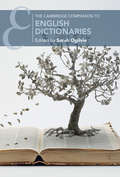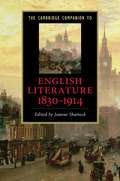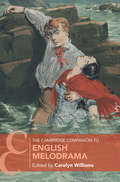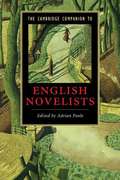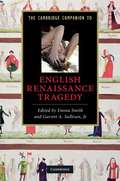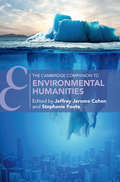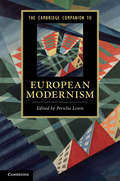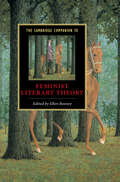- Table View
- List View
The Cambridge Companion to Elizabeth Bishop
by Angus Cleghorn Jonathan EllisElizabeth Bishop is increasingly recognized as one of the twentieth century's most important and original poets. Initially celebrated for the minute detail of her descriptions, what John Ashbery memorably called her thinginess, Bishop's reputation has risen dramatically since her death, in part due to the publication of new work, including letters, stories, and visual art, as well as a controversial volume of uncollected poems, drafts, and fragments. This Companion engages with key debates surrounding the interpretation and reception of Bishop's published and unpublished writing in relation to questions of biography, the natural world, and politics. Individual chapters focus on well-known texts such as North & South, Questions of Travel, and Geography III, while offering fresh readings of the significance of Nova Scotia, Massachusetts, and Brazil to Bishop's life and work. With a chronology and guide to further reading, this volume explores the full range of Bishop's artistic achievements and the extent to which the posthumous publications have contributed to her enduring popularity.
The Cambridge Companion to Elizabeth Gaskell
by Jill L. MatusIn the last few decades Elizabeth Gaskell has become a figure of growing importance in the field of Victorian literary studies. She produced work of great variety and scope in the course of a highly successful writing career that lasted for about twenty years from the mid-1840s to her unexpected death in 1865. The essays in this Companion draw on recent advances in biographical and bibliographical studies of Gaskell and cover the range of her impressive and varied output as a writer of novels, biography, short stories, and letters. The volume, which features well-known scholars in the field of Gaskell studies, focuses throughout on her narrative versatility and her literary responses to the social, cultural, and intellectual transformations of her time. This Companion will be invaluable for students and scholars of Victorian literature, and includes a chronology and guide to further reading.
The Cambridge Companion to Emily Dickinson
by Wendy MartinEmily Dickinson, one of the most important American poets of the nineteenth century, remains an intriguing and fascinating writer. The Cambridge Companion to Emily Dickinson includes eleven new essays by accomplished Dickinson scholars. They cover Dickinson's biography, publication history, poetic themes and strategies, and her historical and cultural contexts. As a woman poet, Dickinson's literary persona has become incredibly resonant in the popular imagination. She has been portrayed as singular, enigmatic, and even eccentric. At the same time, Dickinson is widely acknowledged as one of the founders of American poetry, an innovative pre-modernist poet as well as a rebellious and courageous woman. This volume introduces new and practised readers to a variety of critical responses to Dickinson's poetry and life, and provides several valuable tools for students, including a chronology and suggestions for further reading.
The Cambridge Companion to English Dictionaries (Cambridge Companions to Literature)
by Sarah OgilvieHow did a single genre of text have the power to standardise the English language across time and region, rival the Bible in notions of authority, and challenge our understanding of objectivity, prescription, and description? Since the first monolingual dictionary appeared in 1604, the genre has sparked evolution, innovation, devotion, plagiarism, and controversy. This comprehensive volume presents an overview of essential issues pertaining to dictionary style and content and a fresh narrative of the development of English dictionaries throughout the centuries. Essays on the regional and global nature of English lexicography (dictionary making) explore its power in standardising varieties of English and defining nations seeking independence from the British Empire: from Canada to the Caribbean. Leading scholars and lexicographers historically contextualise an array of dictionaries and pose urgent theoretical and methodological questions relating to their role as tools of standardisation, prestige, power, education, literacy, and national identity.
The Cambridge Companion to English Literature 1500-1600
by Arthur F. KinneyThis is the first comprehensive account of English Renaissance literature in the context of the culture which shaped it: the courts of Henry VIII and Elizabeth I, the tumult of Catholic and Protestant alliances during the Reformation, the age of printing and of New World discovery. In this century courtly literature under Henry VIII moves toward a new, more personal poetry of sentiment, narrative and romance. The development of English prose is seen in the writing of More, Foxe and Hooker and in the evolution of satire and popular culture. Drama moves from the churches to the commercial playhouses with the plays of Kyd, Marlowe and the early careers of Shakespeare and Jonson. The Companion tackles all these subjects in fourteen newly-commissioned essays, written by experts for student readers. A detailed chronology of major literary achievements concludes with a list of authors and their dates.
The Cambridge Companion to English Literature 1650-1740
by Steven N. ZwickerThis volume offers an account of English literary culture in one of its most volatile and politically engaged moments. From the work of Milton and Marvell in the 1650s and 1660s through the brilliant careers of Dryden, Rochester, and Behn, Locke and Astell, Swift and Defoe, Pope and Montagu, the pressures and extremes of social, political, and sexual experience are everywhere reflected in literary texts: in the daring lyrics and intricate political allegories of this age, in the vitriol and bristling topicality of its satires as well as in the imaginative flight of its mock epics, fictions, and heroic verse. The volume's chronologies and select bibliographies will guide the reader through texts and events, while the fourteen essays commissioned for this Companion will allow us to read the period anew.
The Cambridge Companion to English Literature 1740-1830
by Thomas Keymer Jon MeeThis 2004 volume offers an introduction to British literature that challenges the traditional divide between eighteenth-century and Romantic studies. Contributors explore the development of literary genres and modes through a period of rapid change. They show how literature was shaped by historical factors including the development of the book trade, the rise of literary criticism and the expansion of commercial society and empire. The first part of the volume focuses on broad themes including taste and aesthetics, national identity and empire, and key cultural trends such as sensibility and the gothic. The second part pays close attention to the work of individual writers including Sterne, Blake, Barbauld and Austen, and to the role of literary schools such as the Lake and Cockney schools. The wide scope of the collection, juxtaposing canonical authors with those now gaining new attention from scholars, makes it essential reading for students of eighteenth-century literature and Romanticism.
The Cambridge Companion to English Literature, 1830-1914
by Joanne ShattockThe nineteenth century witnessed unprecedented expansion in the reading public and an explosive growth in the number of books and newspapers produced to meet its demands. These specially commissioned essays examine not only the full range and variety of texts that entertained and informed the Victorians, but also the boundaries of Victorian literature: the links and overlap with Romanticism in the 1830s, and the roots of modernism in the years leading up to the First World War. The Companion demonstrates how science, medicine and theology influenced creative writing and emphasizes the importance of the visual in painting, book illustration and in technological innovations from the kaleidoscope to the cinema. Essays also chart the complex and fruitful interchanges with writers in America, Europe and the Empire, highlighting the geographical expansion of literature in English. This Companion brings together the most important aspects of this prolific and popular period of English literature.
The Cambridge Companion to English Melodrama (Cambridge Companions to Literature)
by Carolyn WilliamsThis newly commissioned series of essays by leading scholars is the first volume to offer both an overview of the field and also current emerging critical views on the history, form, and influence of English melodrama. Authoritative voices provide an introduction to melodrama's early formal features such as tableaux and music, and trace the development of the genre in the nineteenth century through the texts and performances of its various sub-genres, the theatres within which the plays were performed, and the audiences who watched them. The historical contexts of melodrama are considered through essays on topics including contemporary politics, class, gender, race, and empire. And the extensive influences of melodrama are demonstrated through a wide-ranging assessment of its ongoing and sometimes unexpected expressions - in psychoanalysis, in other art forms (the novel, film, television, musical theatre), and in popular culture generally - from the nineteenth to the twenty-first century.
The Cambridge Companion to English Novelists
by Adrian PooleIn this Companion, leading scholars and critics address the work of the most celebrated and enduring novelists from the British Isles (excluding living writers): among them Defoe, Richardson, Sterne, Austen, Dickens, the Brontës, George Eliot, Hardy, James, Lawrence, Joyce, and Woolf. The significance of each writer in their own time is explained, the relation of their work to that of predecessors and successors explored, and their most important novels analysed. These essays do not aim to create a canon in a prescriptive way, but taken together they describe a strong developing tradition of the writing of fictional prose over the past 300 years. This volume is a helpful guide for those studying and teaching the novel, and will allow readers to consider the significance of less familiar authors such as Henry Green and Elizabeth Bowen alongside those with a more established place in literary history.
The Cambridge Companion to English Poetry Donne to Marvell
by Thomas N. CornsEnglish poetry in the first half of the seventeenth century is an outstandingly rich and varied body of verse, which can be understood and appreciated more fully when set in its cultural and ideological context. This student Companion, consisting of fourteen new introductory essays by scholars of international standing, informs and illuminates the poetry by providing close reading of texts and an exploration of their background. There are individual studies of Donne, Jonson, Herrick, Herbert, Carew, Suckling, Lovelace, Milton, Crashaw, Vaughan and Marvell. More general essays describe the political and religious context of the poetry, explore its gender politics, explain the material circumstances of its production and circulation, trace its larger role in the development of genre and tradition, and relate it to contemporary rhetorical expectation. Overall the Companion provides an indispensable guide to the texts and contexts of early-seventeenth-century English poetry.
The Cambridge Companion to English Poets
by Claude RawsonThis volume provides lively and authoritative introductions to twenty-nine of the most important British and Irish poets from Geoffrey Chaucer to Philip Larkin. The list includes, among others, Shakespeare, Donne, Milton, Wordsworth, Browning, Yeats and T. S. Eliot, and represents the tradition of English poetry at its best. Each contributor offers a new assessment of a single poet's achievement and importance, with readings of the most important poems. The essays, written by leading experts, are personal responses, written in clear, vivid language, free of academic jargon, and aim to inform, arouse interest, and deepen understanding.
The Cambridge Companion to English Renaissance Tragedy
by Emma Smith Garrett A. Sullivan JrFeaturing essays by major international scholars, this Companion combines analysis of themes crucial to Renaissance tragedy with the interpretation of canonical and frequently taught texts. Part I introduces key topics, such as religion, revenge, and the family, and discusses modern performance traditions on stage and screen. Bridging this section with Part II is a chapter which engages with Shakespeare. It tackles Shakespeare's generic distinctiveness and how our familiarity with Shakespearean tragedy affects our appreciation of the tragedies of his contemporaries. Individual essays in Part II introduce and contribute to important critical conversations about specific tragedies. Topics include The Revenger's Tragedy and the theatrics of original sin, Arden of Faversham and the preternatural, and The Duchess of Malfi and the erotics of literary form. Providing fresh readings of key texts, the Companion is an essential guide for all students of Renaissance tragedy.
The Cambridge Companion to English Restoration Theatre
by Deborah Payne FiskThis rich and varied portrait of drama from 1660 to 1714 provides students with essential information about playwrights, staging and genres in their social and political context. The theater that followed the Restoration of Charles II is revealed in all of its tumult, energy and conflict. Contributors pay attention to major and minor playwrights, the first professional female dramatists, the performance aspects of the drama and the main dramatic genres and themes.
The Cambridge Companion to English Short Story: The Cambridge Companion to the English Short Story
by Ann-Marie EinhausThis Companion provides an accessible overview of short fiction by writers from England, Scotland, Ireland, Wales, and other international sites. A collection of international experts examine the development of the short story in a variety of contexts from the early nineteenth century to the present. They consider how dramatic changes in the publishing landscape during this period - such as the rise of the fiction magazine and the emergence of new opportunities in online and electronic publishing - influenced the form, covering subgenres from detective fiction to flash fiction. Drawing on a wealth of critical scholarship to place the short story in the English literary tradition, this volume will be an invaluable guide for students of the short story in English.
The Cambridge Companion to Environmental Humanities (Cambridge Companions to Literature)
by Jeffrey Jerome Cohen Stephanie FooteThis Companion offers a comprehensive and accessible introduction to the environmental humanities, an interdisciplinary movement that responds to a world reconfigured by climate change and its effects, from environmental racism and global migration to resource impoverishment and the importance of the nonhuman world. It addresses the twenty-first century recognition of an environmental crisis – its antecedents, current forms, and future trajectories – as well as possible responses to it. This books foregrounds scholarship from different periods, fields, and global locations, but it is organized to give readers a working context for the foundational debates. Each chapter examines a key topic or theme in Environmental Humanities, shows why that topic emerged as a category of study, explores the different approaches to the topics, suggests future avenues of inquiry, and considers the topic's global implications, especially those that involve environmental justice issues.
The Cambridge Companion to Eugene O'Neill
by Michael ManheimThis volume of specially commissioned essays contains studies of O'Neill's life, his intellectual and creative forebears, and his relation to the theatrical world of his creative period, 1916-1942. Also included are descriptions of the O'Neill canon and its production history on stage and screen, and a series of essays on "special topics" related to the playwright. One of the essays speaks for those who are critical of O'Neill's work, and the volume concludes with an essay on O'Neill criticism containing a select bibliography of full-length studies of the playwright's work.
The Cambridge Companion to European Modernism
by Pericles LewisModernism arose in a period of accelerating globalization in the late nineteenth century. Modernist writers and artists, while often loyal to their country in times of war, aimed to rise above the national and ideological conflicts of the early twentieth century in service to a cosmopolitan ideal. This Companion explores the international aspects of literary modernism by mapping the history of the movement across Europe and within each country. The essays place the various literary traditions within a social and historical context and set out recent critical debates. Particular attention is given to the urban centers in which modernism developed from Dublin to Zurich, Barcelona to Warsaw and to the movements of modernists across national borders. A broad, accessible account of European modernism, this Companion explores what this cosmopolitan movement can teach us about life as a citizen of Europe and of the world.
The Cambridge Companion to European Novelists
by Michael BellA lively and comprehensive account of the whole tradition of European fiction for students and teachers of comparative literature, this volume covers twenty-five of the most significant and influential novelists in Europe from Cervantes to Kundera. Each essay examines an author's use of, and contributions to the genre, and also engages in an important aspect of the form, such as its relation to romance or one of its sub-genres, such as the Bildungsroman. Larger theoretical questions are introduced through specific readings of exemplary novels. Taking a broad historical and geographic view, the essays keep in mind the role the novel itself has played in the development of European national identities and in cultural history over the last four centuries. While conveying essential introductory information for new readers, these authoritative essays reflect up-to-date scholarship and also review, and sometimes challenge, conventional accounts.
The Cambridge Companion to F. Scott Fitzgerald
by Ruth PrigozyEleven specially commissioned essays by major Fitzgerald scholars present a clearly written and comprehensive assessment of F. Scott Fitzgerald as a writer and as a public and private figure. No aspect of his career is overlooked, from his first novel published in 1920, through his more than 170 short stories, to his last unfinished Hollywood novel. Contributions present the reader with a full and accessible picture of the background of American social and cultural change in the early decades of the twentieth century. The introduction traces Fitzgerald's career as a literary and public figure, and examines the extent to which public recognition has affected his reputation among scholars, critics, and general readers over the past sixty years. This volume offers undergraduates, graduates and general readers a full account of Fitzgerald's work as well as suggestions for further exploration of his work.
The Cambridge Companion to Fairy Tales
by Maria TatarFairy tales have never known geographical, disciplinary or cultural borders. In many ways, they provide a model for thinking about storytelling on a transnational level long before comparative literature began transforming itself into world literature. As the simple expression of complex thought, fairy tales have increasingly become the focus of intense scholarly inquiry. In this Companion, international scholars from a range of academic disciplines explore the historical origins, cultural dissemination and psychological power of fairy stories, and offer model interpretations of tales from a variety of traditions and sources, including Charles Perrault, the Brothers Grimm and the One Thousand and One Nights. Rather than disenchanting the stories, the essays in this volume broaden our understanding of them and deepen our appreciation of the cultural work they do. A chronology and guide to further reading contribute to the usefulness of the volume for students and scholars.
The Cambridge Companion to Fantasy Literature
by Farah Mendlesohn Edward JamesFantasy is a creation of the Enlightenment and the recognition that excitement and wonder can be found in imagining impossible things. From the ghost stories of the Gothic to the zombies and vampires of twenty-first-century popular literature, from Mrs Radcliffe to Ms Rowling, the fantastic has been popular with readers. Since Tolkien and his many imitators, however, it has become a major publishing phenomenon. In this volume, critics and authors of fantasy look at the history of fantasy since the Enlightenment, introduce readers to some of the different codes for the reading and understanding of fantasy and examine some of the many varieties and subgenres of fantasy; from magical realism at the more literary end of the genre, to paranormal romance at the more popular end. The book is edited by the same pair who edited The Cambridge Companion to Science Fiction (winner of a Hugo Award in 2005).
The Cambridge Companion to Feminist Literary Theory
by Ellen RooneyFeminism has dramatically influenced the way literary texts are read, taught and evaluated. Feminist literary theory has deliberately transgressed traditional boundaries between literature, philosophy and the social sciences in order to understand how gender has been constructed and represented through language. This lively and thought-provoking Companion presents a range of approaches to the field. Some of the essays demonstrate feminist critical principles at work in analysing texts, while others take a step back to trace the development of a particular feminist literary method. The essays draw on a range of primary material from the medieval period to postmodernism and from several countries, disciplines and genres. Each essay suggests further reading to explore this field further. This is the most accessible guide available both for students of literature new to this developing field, and for students of gender studies and readers interested in the interactions of feminism, literary criticism and literature.
The Cambridge Companion to Fiction in the Romantic Period
by Richard Maxwell Katie TrumpenerWhile poetry has been the genre most closely associated with the Romantic period, the novel of the late eighteenth and early nineteenth centuries has attracted many more readers and students in recent years. Its canon has been widened to include less well known authors alongside Jane Austen, Walter Scott, Maria Edgeworth and Thomas Love Peacock. Over the last generation, especially, a remarkable range of popular works from the period have been re-discovered and reread intensively. This Companion offers an overview of British fiction written between roughly the mid-1760s and the early 1830s and is an ideal guide to the major authors, historical and cultural contexts, and later critical reception. The contributors to this volume represent the most up-to-date directions in scholarship, charting the ways in which the period's social, political and intellectual redefinitions created new fictional subjects, forms and audiences.
The Cambridge Companion to Flaubert
by Timothy UnwinThis volume brings together a series of essays by acknowledged experts on Flaubert. It offers a coherent overview of the writer's work and critical legacy, and provides insights into the very latest scholarly thinking. While a central place is given to Flaubert's most widely read texts, attention is also paid to key areas of the corpus that have tended to be overlooked. Close textual analyses are accompanied by discussion of broader theoretical issues, and by a consideration of Flaubert's place in the wider traditions that he both inherited and influenced. These essays provide not only a robust critical framework for readers of Flaubert, but also a fuller understanding of why he continues to exert such a powerful influence on literature and literary studies today. A concluding essay by the prize-winning author Mario Vargas Llosa examines Flaubert's legacy from the point of view of the modern novelist.

